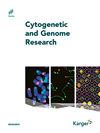Putative Condition-Dependent Viability Selection in Wild-Type Stocks of Drosophila pseudoobscura
IF 1.7
4区 生物学
Q4 CELL BIOLOGY
引用次数: 0
Abstract
Meiotic recombination rates vary in response to intrinsic and extrinsic factors. Recently, heat stress has been shown to reveal plasticity in recombination rates in Drosophila pseudoobscura. Here, a combination of molecular genotyping and X-linked recessive phenotypic markers were used to investigate differences in recombination rates due to heat stress. In addition, haplotypes from the genetic crosses were compared to test if they deviated from equal proportions, which would indicate viability selection. To avoid this potential bias, SNP genotyping markers overlapping the regions assayed with mutant markers were used to further investigate recombination rate. Interestingly, skews in haplotype frequency were consistent with the fixation of alleles in the wild-type stocks used that are unfit at high temperature. Evidence of viability selection due to heat stress in the wild-type haplotypes was most apparent on days 7–9 when more mutant non-crossover haplotypes were recovered in comparison to wild type (p < 0.0001). Recombination analysis using SNP markers showed days 9–10 as significantly different due to heat stress in 2 pairs of consecutive SNP markers (p = 0.018; p = 0.015), suggesting that during this time period the recombination rate is most sensitive to heat stress. This peak timing for recombination plasticity is consistent with Drosophila melanogaster based on a comparison of similarly timed key meiotic events, enabling future mechanistic work of temperature stress on recombination rate.拟模糊果蝇野生种群的假定条件相关生存力选择
减数分裂重组率随内在和外在因素的变化而变化。最近,热应力已经显示出假暗果蝇重组率的可塑性。在这里,分子基因分型和X连锁隐性表型标记的组合被用来研究由于热应激引起的重组率的差异。此外,将遗传杂交的单倍型进行比较,以测试它们是否偏离了相等的比例,这将表明生存能力的选择。为了避免这种潜在的偏差,使用与突变标记物检测的区域重叠的SNP基因分型标记物来进一步研究重组率。有趣的是,单倍型频率的偏斜与不适合在高温下使用的野生型种群中等位基因的固定一致。与野生型相比,野生型单倍型在第7-9天恢复了更多的突变非交叉单倍型(p<0.0001)。使用SNP标记的重组分析显示,由于热应激,第9-10天两对连续SNP标记存在显著差异(p=0.018;p=0.015),表明在这段时间内,复合率对热应力最敏感。基于对类似时间的关键减数分裂事件的比较,重组可塑性的峰值时间与黑腹果蝇一致,这使得未来能够对温度应力对重组率进行机制研究。
本文章由计算机程序翻译,如有差异,请以英文原文为准。
求助全文
约1分钟内获得全文
求助全文
来源期刊

Cytogenetic and Genome Research
生物-细胞生物学
CiteScore
3.10
自引率
5.90%
发文量
25
审稿时长
1 months
期刊介绍:
During the last decades, ''Cytogenetic and Genome Research'' has been the leading forum for original reports and reviews in human and animal cytogenetics, including molecular, clinical and comparative cytogenetics. In recent years, most of its papers have centered on genome research, including gene cloning and sequencing, gene mapping, gene regulation and expression, cancer genetics, comparative genetics, gene linkage and related areas. The journal also publishes key papers on chromosome aberrations in somatic, meiotic and malignant cells. Its scope has expanded to include studies on invertebrate and plant cytogenetics and genomics. Also featured are the vast majority of the reports of the International Workshops on Human Chromosome Mapping, the reports of international human and animal chromosome nomenclature committees, and proceedings of the American and European cytogenetic conferences and other events. In addition to regular issues, the journal has been publishing since 2002 a series of topical issues on a broad variety of themes from cytogenetic and genome research.
 求助内容:
求助内容: 应助结果提醒方式:
应助结果提醒方式:


